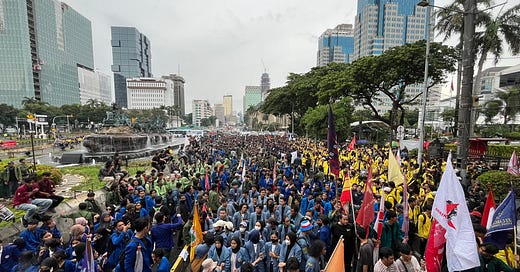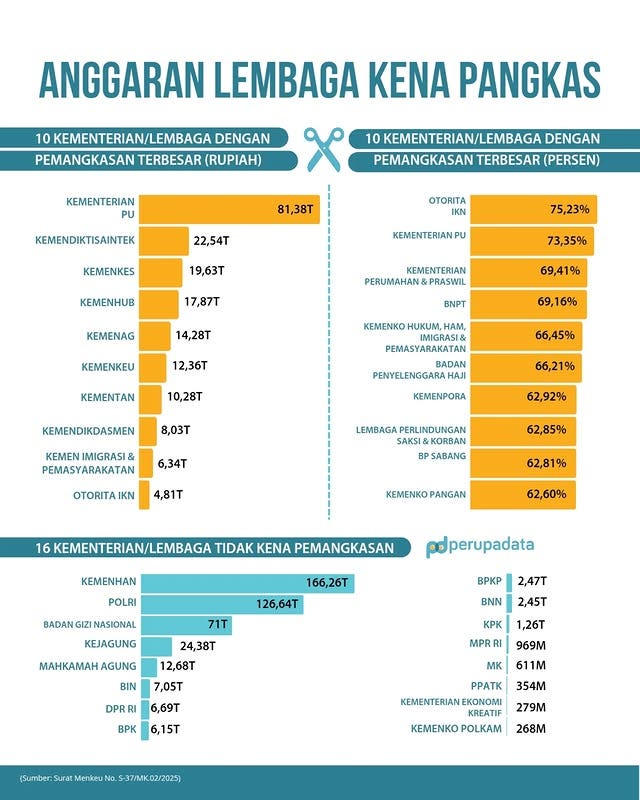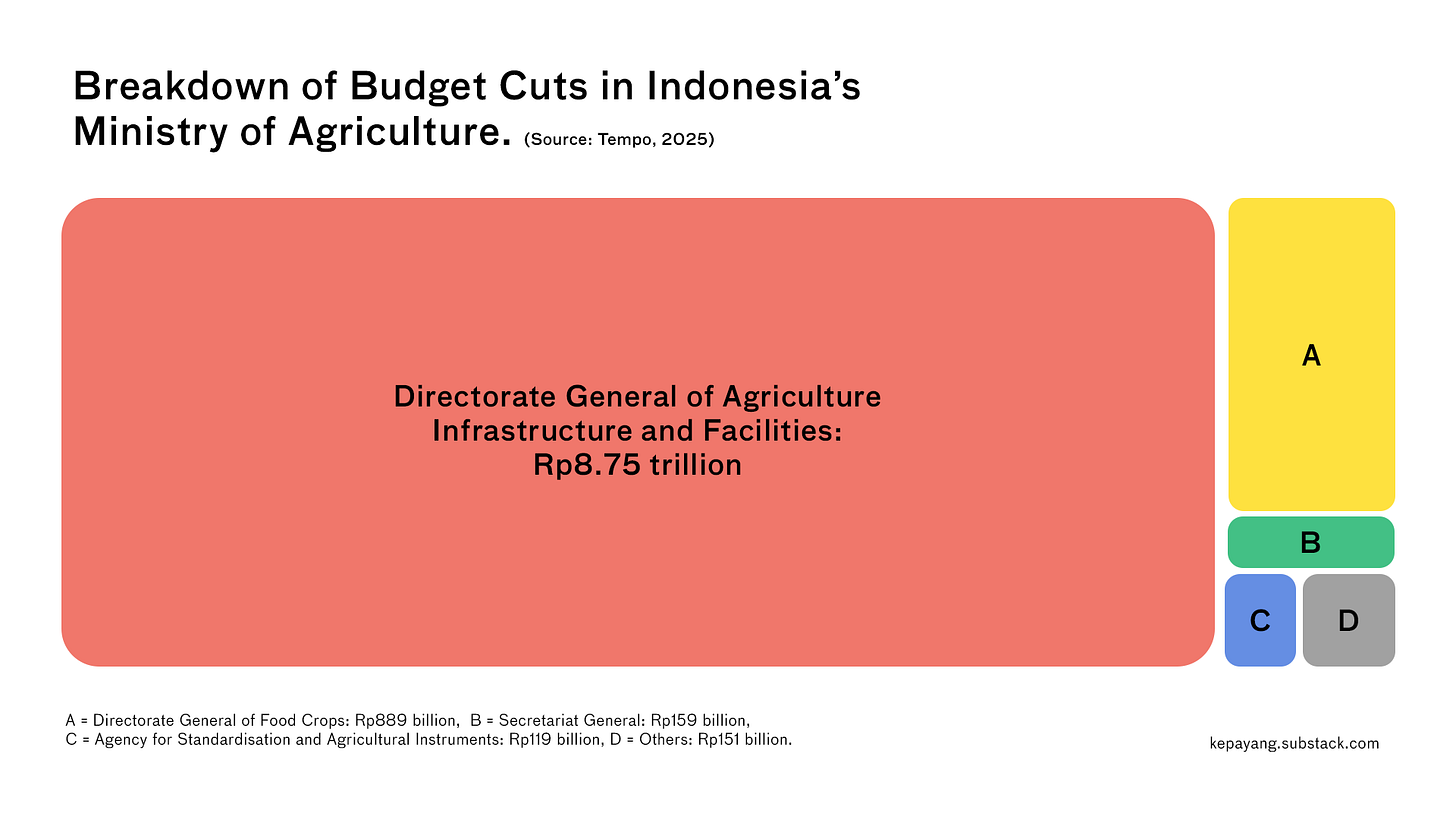Making Sense of Indonesia's Agricultural Budget Cuts
Spoiler alert: we'll all pay extra at the warung.

Halo and Happy Monday, everyone! Last Friday marked the start of Ramadan, and many of us in Indonesia celebrated by spending time with family and friends. If you're fasting, I hope everything goes smoothly for you until the end of the month.
Today's newsletter is a response to the recent Indonesia Gelap (Dark Indonesia) protest that took place earlier this month. I’ll admit, I wasn’t the most informed about it at first, but one of the great things about writing is that it pushes me to educate myself. Through my research, I’ve learned a lot about the key demands raised during the protest, including concerns over the first Presidential Instruction of the year, which calls for budget cuts across multiple ministries.
I want to focus on what this means specifically for the Kementerian Pertanian (Ministry of Agriculture). Budget cuts in the Ministry of Agriculture affect farmers' ability to produce food and eventually impact food prices. In addition, the Ministry of Agriculture has yet to release details about which areas will face spending cuts. This lack of transparency means we must stay informed, push for transparency, and advocate for more awareness. Let’s dive in.
Kepayang is free for now, so any engagements mean so much to support the platform’s growth. You can subscribe to get the newsletter sent directly to your email, like, comment, and share if you resonate with what I write.
Alternatively, you can buy me a coffee through my PayPal here: https://paypal.me/chalafabia - or if you’re based in Indonesia, you can send your donation through QRIS here (under the name Tamanan). Any amounts are welcomed and will directly contribute to sustaining this platform to cover expenses related to operations, research, writing, and marketing. ☕️
As much as I want to be optimistic about 2025, unfortunately, this year didn’t start well for Indonesia. From the recent news of petrol corruption, the flop new capital city, and the shady Danantara, honestly, it’s so hard for us to pick a struggle.
But what I want to talk about today is the budget cuts across the Indonesian government.
On the 22nd of January, our new president issued their first Instruksi Presiden (Presidential Instruction) of the year, ordering spending efficiency in implementing the national and regional budget for the 2025 fiscal year. TL;DR: Budget cuts across ministries.
A review of this Presidential Instruction, along with a few other demands, was voiced during the Indonesia Gelap protests, organised by several student bodies on the 20th of February at multiple locations, including the Istana Merdeka (State Palace) in Central Jakarta. But as of now, there’s still no response from the president.
Budget cuts are essentially a form of cost-saving. The government realises that expenses like office supplies, ceremonial events, and official trips can be reduced, especially if they’re just supporting costs with no measurable output. But with the total budget cut reaching Rp306 trillion, the real question is: where is all that money actually going?
And, we all know the answer: to fund the Makan Bergizi Gratis program. But that’s a discussion for another day.
Caption for above visual: Massive Budget Cuts – Several ministries face major funding reductions.
Several ministries have been hit by these budget cuts, including the Kementerian Pertanian (Ministry of Agriculture) which lost Rp10.28 trillion in funding. At first, Agriculture Minister, Andi Amran Sulaiman said the cuts wouldn’t get in the way of Indonesia’s food self-sufficiency program (10/2/2025). But just three days later, he seemed to change his mind, saying the budget cuts would affect things like procurement of farming equipment, land use, and irrigation management (13/2/2025). I guess he’s not the same person he was three days ago!
As of today, we still haven’t been given clear details on what exactly these budget cuts will look like in the Ministry of Agriculture. But we can make an educated guess about what’s likely to be affected.
In a recent Tempo article, it is reported that the budget reduction will be applied as follows:
If all these names sound like a bunch of bureaucratic jargon to you, I get it. I’m just as unfamiliar with most of these government bodies, let alone their exact functions. But let’s start somewhere. Let’s look into the one that got hit hardest by the budget cuts: the Directorate General of Agriculture Infrastructure and Facilities. Such a mouthful name. Let’s call them the FarmVille Final Boss.
First up, what do they do exactly? Quoting from their official webpage, and translating it to everyday language, there are several important things that they do:
They create policies for several things, including protecting farmland, improving irrigation systems, and providing financial assistance and access for farmers to get fertilisers, pesticides, and farming equipment.
They also make sure these policies are put into action
They provide technical assistance, guidance, and supervision for farmers to improve and protect their lands.
Basically, the FarmVille Final Boss makes sure farmers have everything they need, from land, water, funding, tools, and support to grow food. So, what happens when they suddenly lose trillions of Rupiah in funding?
First, farmers might get less help buying tools, fertilisers, and pesticides, which makes farming more expensive. This could mean a higher chance of failed harvests.
Second, fixing and upgrading irrigation systems could slow down, making it harder for farmers to get water for their crops.
Third, there will be less effort to expand and protect farmland, which is bad news because it leaves farmers vulnerable. More land could be converted for non-farming use, meaning less space to grow food.
And finally, the part that affects all of us: food prices could go up, and we might even see food shortages because farmers just won’t be able to produce as much.
Staple foods like rice, corn, and soybeans will likely see the fastest price increases. This could lead to higher costs for daily meals, more expensive street food, and increased pressure on food businesses.
Too much for a Monday Morning? I got you.
Initially, I thought the President’s Instruction wouldn’t affect my daily life. Honestly, I was lucky to even think that way because I was in a privileged position. I’m not directly impacted like, say, farmers. But after digging deeper, it turns out this could hit us all in some way. And if we just sit back and do nothing, well… we might just get crushed by our own government.
Unfortunately, we don’t have much control over how policies are made.
Not everyone, including me, feels safe going out to protest, and even those who do, often find their demands ignored. So, to wrap this up, I want to share that as everyday citizens, we still have other ways to take action besides protesting:
Staying Informed: The least we can do is stay informed. Follow credible news sources, demand transparency from the government, and hold policymakers accountable, even if it’s just through social media.
Support Local Farmers: Another thing (which might sound like a broken record, but it's still super important) is to support local farmers. Buying from traditional markets, cooperatives, and local farms helps keep them afloat despite all these challenges.
Advocate: We can still make a difference by spreading awareness through social media, blogs, and discussions. Every share, comment, and conversation matters. So, if this resonates with you, engage and keep the conversation going.
This new year has been full of flops for Indonesia. Feeling overwhelmed is normal, and so is feeling hopeless. But I hope today’s newsletter sheds some light on a small part of what’s happening in the country. It is a flop era. But sometimes, after the hardest flop, comes the biggest slay. And you could be a part of that too.
Other contents that I made recently:
🛵 Read about how food delivery apps played us: here.
🇹🇼 Read about what I ate in Taiwan, but I won’t tell you about the taste: here.
✈️ Read about why I think aeroplane food deserves more love: here.
🇹🇷 Read on how I learned about Turkiye’s inflation through food: here.
💥 Read about the smart Indonesian crunch culture: here.
🚦 Read on the problem behind street food vendors relocation: here.
🤔 Read on how Indonesians please others when it comes to food: here.
If you like today’s newsletter, please like and share it with your friends! Comment down below your thoughts and let me know if you have any other topics you want me to discuss. Until then, I’ll see you in two weeks!
Follow me everywhere:
TikTok: @berusahavegan
Kepayang’s Instagram: @readkepayang
Instagram: @menggemaskan
LinkedIn: Chalafabia Haris
Work with me: readkepayang@gmail.com








